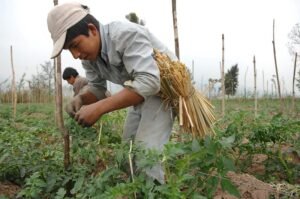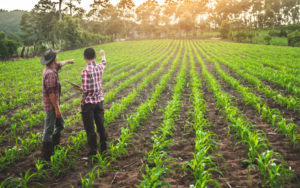Agricultural Education in Bulgaria: Nurturing a Thriving Agrarian Sector. Bulgaria, a country rich in agricultural heritage, has long relied on its fertile lands and favorable climate to cultivate a thriving agrarian sector. To sustain and advance this essential industry, the nation has made significant investments in agricultural education. This article delves into the history, current state, and future prospects of agricultural education in Bulgaria, highlighting its pivotal role in shaping the country’s agricultural landscape.
Agricultural Education in Bulgaria: Nurturing a Thriving Agrarian Sector
Historical Perspective: Roots of Agricultural Education
The roots of agricultural education in Bulgaria can be traced back to the mid-19th century. At that time, following the country’s liberation from Ottoman rule in 1878, the young nation sought to develop its economy and modernize its agricultural practices. As a result, several agricultural schools and colleges were established.
The first agricultural school in Bulgaria, the Odessa Agricultural School, was founded in 1879. It aimed to provide theoretical and practical knowledge to students, enabling them to become skilled farmers and agronomists. The establishment of such educational institutions laid the foundation for the growth and development of the agricultural sector in the years to come.

Advancements in Agricultural Education
Over the years, agricultural education in Bulgaria has undergone significant transformations to adapt to changing needs and technologies. One of the most notable developments was the establishment of the Higher Institute of Agriculture (presently known as the Agricultural University of Plovdiv) in 1945. This marked a milestone in the country’s agricultural education, offering higher education opportunities to aspiring agronomists and researchers.
Throughout the communist era, agricultural education received substantial support from the government. The regime prioritized the development of the agrarian sector, and as a result, agricultural schools and colleges were expanded, and research institutions were established. The aim was to achieve self-sufficiency in food production and elevate Bulgaria’s status as an agricultural powerhouse within the Eastern Bloc.
The Post-Communist Era: Challenges and Revival
The collapse of communism in 1989 brought significant changes to Bulgaria’s agricultural education landscape. The economic transition and political upheavals presented challenges to the sector, including declining financial support, outdated curricula, and brain drain, as many experts sought opportunities abroad.
However, amidst these challenges, agricultural education in Bulgaria displayed resilience and adaptability. The sector underwent reforms to align with European Union (EU) standards as the country aspired to join the EU. The government recognized the importance of investing in agricultural education to modernize the sector and ensure its competitiveness in the global market.
As a part of its EU accession process, Bulgaria implemented the Common Agricultural Policy (CAP), which emphasized sustainable agricultural practices, rural development, and modernization. These principles were integrated into agricultural education curricula to equip students with the knowledge and skills needed to address contemporary agricultural challenges.

Current State of Agricultural Education
Today, Bulgaria boasts a well-established and diverse system of agricultural education. The sector comprises universities, colleges, and specialized vocational schools, catering to various educational levels and fields of study related to agriculture.
- Agricultural Universities: Bulgaria is home to several agricultural universities that offer a wide array of courses and degrees related to agriculture, agronomy, horticulture, animal husbandry, agricultural economics, and more. These universities play a pivotal role in nurturing the next generation of agricultural professionals and researchers.
- Colleges and Vocational Schools: In addition to universities, there are numerous agricultural colleges and vocational schools across the country. These institutions provide specialized training to students who wish to pursue careers in practical aspects of agriculture, such as farming, animal breeding, and agricultural machinery operation.
- Research and Innovation: Agricultural education in Bulgaria also emphasizes research and innovation. Research institutes and departments within universities contribute to cutting-edge agricultural research, developing new technologies, and promoting sustainable practices in the sector.
Challenges and Opportunities
While agricultural education in Bulgaria has made significant strides, it still faces challenges that need to be addressed to ensure the sector’s sustained growth and prosperity:
- Funding and Resources: Adequate funding and resources are essential for maintaining high-quality agricultural education. Ensuring sufficient financial support will enable institutions to upgrade infrastructure, acquire modern equipment, and attract talented faculty.
- Alignment with Industry Needs: Agricultural education must stay closely aligned with the evolving needs of the industry. Constant dialogue and collaboration with stakeholders, including farmers, agribusinesses, and government agencies, can help tailor educational programs to meet the sector’s demands effectively.
- Promoting Interest in Agriculture: Encouraging young people to pursue careers in agriculture is crucial to building a skilled and motivated workforce. Raising awareness about the diverse and rewarding opportunities in agriculture can attract more students to agricultural education programs.
- Sustainable Practices: Integrating sustainable agricultural practices into the curricula is essential to prepare future farmers and agronomists to address environmental challenges and contribute to the nation’s sustainability goals.

Conclusion
Agricultural education in Bulgaria has come a long way since its inception in the 19th century. Today, it stands as a cornerstone of the country’s agricultural sector, nurturing skilled professionals, promoting innovation, and supporting sustainable development. As Bulgaria continues its journey as an EU member state, the importance of investing in agricultural education remains paramount. By addressing challenges, embracing opportunities, and fostering collaboration between academia and industry, Bulgaria can strengthen its agricultural education system, ensuring the continued growth and prosperity of its agrarian sector for generations to come.
